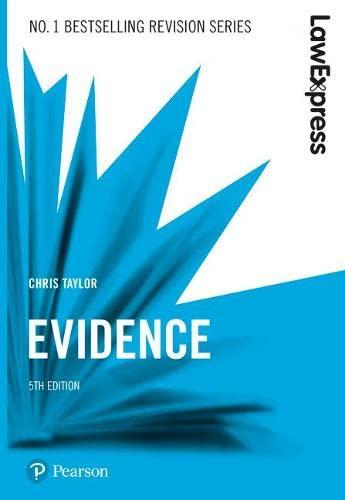Question
LANDMARK CASE Carlill v Carbolic Smoke Ball Co , [1893] 1 QB 256 (Eng CA) THE HISTORICAL CONTEXT : This case was decided at a
LANDMARK CASE
Carlill v Carbolic Smoke Ball Co, [1893] 1 QB 256 (Eng CA)
THE HISTORICAL CONTEXT: This case was decided at a time when Victorian England was being inundated with quack cures. Examples of "miracle" cures included Epps Glycerine Jube Jubes and a product called Pepsolic, which claimed to prevent marriage breakups because it prevented indigestion. The ad for this product noted that indigestion "Causes Bad Temper, Irritability, Peppery Disposition, Domestic Quarrels, Separation andthe Divorce Court."25
FACTUAL BACKGROUND: This case considers the legal obligations that resulted from the advertisement placed by the Carbolic Smoke Ball Company in a London newspaper at the turn of the 19th century
Mrs. Carlill used the smoke ball as directed for two weeks but caught influenza anyway. When the company refused to pay her the advertised reward, she commenced an action for breach of contract.
THE LEGAL QUESTION: Was there a contract between the parties, even though Mrs. Carlill did not communicate her acceptance of the Carbolic Smoke Ball Company's offer?
RESOLUTION: While communication of acceptance is generally required, this is not always the case. Because the Carbolic Smoke Ball Companythe offerorhad chosen to dispense with the necessity of notice, it could not complain about Mrs. Carlill's failure to communicate acceptance now. In the end, the court found that Mrs. Carlill had accepted the company's offer of a reward by using the smoke ball as requested and that, upon becoming sick, she was contractually entitled to the 100.
Question:
This case is an example of an offer of a unilateral contract, though the court did not identify it as such. Through such an offer, the offeror promises to pay the offeree a sum of money if the offeree performs the requested act. For example, a company might offer a $200 reward to anyone who finds a missing laptop computer. Unlike the ordinary business contract, where both parties have obligations, in the unilateral contract only the offeror is bound because the offeree can perform the requested actfind the laptopor not. He has no obligation even to try. If he does find the computer and returns it, the contract is complete, and the offeror is contractually required to pay. For obvious reasons, this kind of offer typically does not require people who decide to look for the computer to advise the company of their intention to do so. From the company's perspective, it is enough to hear from the person who actually finds the computer. Why do you think unilateral contracts would be rare in the business world?
Step by Step Solution
There are 3 Steps involved in it
Step: 1

Get Instant Access to Expert-Tailored Solutions
See step-by-step solutions with expert insights and AI powered tools for academic success
Step: 2

Step: 3

Ace Your Homework with AI
Get the answers you need in no time with our AI-driven, step-by-step assistance
Get Started


